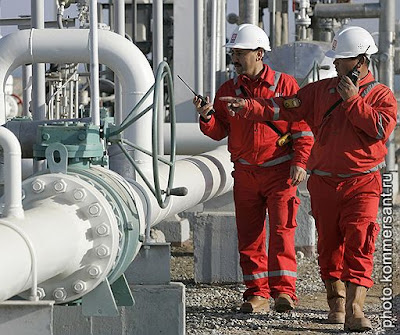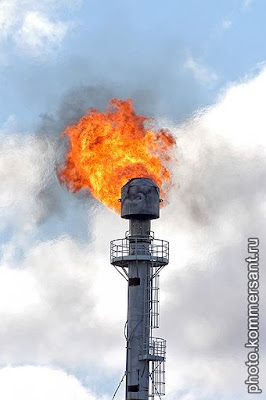
Moscow and Kyiv have moved closer to another gas war ahead of the first meeting between Ukrainian Prime Minister Yulia Timoshenko and her Russian counterpart Viktor Zubkov on January 23 in Moscow. Ukraine wants to get rid of mediators in gas trade with Russia and increase transit rates five-fold. Gazprom fought back saying that due to the shortage of Central Asian gas Ukraine is going to get Russian gas which costs 75 percent more. It means that the Ukrainians are going to face an $830 billion bill in Moscow.
Rosukrenergo CEO and Gazprom’s member of the board Konstantin Chuichenko said that the gas supply from the Central Asia to Ukraine had dropped one-third, or 40 million cu. meters a day. Therefore, the company sent to Ukraine 740 million cu. meters of Russia gas which costs $314.7/1,000 cu. meters.
The shipment of Russian gas costs $233 million, which is $100 million more than the price of the same amount of Asian gas that is sent to Ukraine under deals between Rosukrenergo, Naftogaz and Ukrgaz-energo. Mr. Chuichenk also said that Ukrgaz-energo’s outstanding debt to Rosukrenergo had reached $830 million.
Konstantin Chuichenko’s straight talk came as a reaction to Ukraine’s plans to review gas deals with Russia. Kyiv announced its position Wednesday morning for the upcoming talks starting on Thursday. Ukraine’s first deputy prime minister Alexander Turchinov said that Naftogaz Ukrainy’s new chief executive Oleg Dubina is going to come to Gazprom “within a couple of days” to “discuss a range of issues in gas supply including transit rates”.
Rosukrenergo CEO and Gazprom’s member of the board Konstantin Chuichenko said that the gas supply from the Central Asia to Ukraine had dropped one-third, or 40 million cu. meters a day. Therefore, the company sent to Ukraine 740 million cu. meters of Russia gas which costs $314.7/1,000 cu. meters.
The shipment of Russian gas costs $233 million, which is $100 million more than the price of the same amount of Asian gas that is sent to Ukraine under deals between Rosukrenergo, Naftogaz and Ukrgaz-energo. Mr. Chuichenk also said that Ukrgaz-energo’s outstanding debt to Rosukrenergo had reached $830 million.
Konstantin Chuichenko’s straight talk came as a reaction to Ukraine’s plans to review gas deals with Russia. Kyiv announced its position Wednesday morning for the upcoming talks starting on Thursday. Ukraine’s first deputy prime minister Alexander Turchinov said that Naftogaz Ukrainy’s new chief executive Oleg Dubina is going to come to Gazprom “within a couple of days” to “discuss a range of issues in gas supply including transit rates”.
 A Kommersant source familiar with the preparations for the Ukrainian prime minister’s visit added that Ukraine would like to increase the price for pumping Russia’s gas through to Europe from $1.7 to $9.32 per 1,000 cu. meters.
A Kommersant source familiar with the preparations for the Ukrainian prime minister’s visit added that Ukraine would like to increase the price for pumping Russia’s gas through to Europe from $1.7 to $9.32 per 1,000 cu. meters.Alexander Turchinov also made it clear that Kyiv would ultimately seek to get rid of Rosukrenergo as an in-between in gas supplies to Ukraine as well as put a cap on operations of Ukrgaz-energo, 50 percent owned by Rosukrergo, on the Ukrainian domestic market.
The threat came true in one respect. The supply of Ukrgaz-energo has already been cut to 5 billion cu. meters a year down from 55 billion cu. meters that the company has been allowed to trade with Ukraine’s annual need of 73 to 75 billion cu. meters. Russia sells to its Western neighbor between 42 and 55 billion cu. meters of gas. Ukraine’s new government wants to skim extra profits from Gazprom and increase its transit revenues by five-fold as well as strip the Russian gas monopolist of profits on gas sales on the Ukrainian domestic market. Ukrgaz-energo, a company where Gazprom holds a 25 percent stake, reaped $200 million in 2007.
Gazprom would not comment on Mr. Turchinov’s statement on Wednesday but responded with Konstantin Chuichenko’s speech. Two sources of Kommersant in the Russian gas giant confirmed that Oleg Dubina is due to arrive to their headquarters on Thursday to launch talks on direct gas supply. Back on October 15 Gazprom’s chair of the board and Russian Deputy Prime Minister Dmitry Medvedev mentioned: “We are likely to review our relations with Ukraine and leave out mediator companies.” The price of this concession became clear on Wednesday. This would be $7.43 billion of additional payments.
“Gazprom literally tries to make it clear that it is ready to sell gas to us at this price without Rosukrenergo,” said a high-ranking official from the Ukrainian Fuel and Energy Ministry’s oil, gas and oil processing industry department. “We are ready to buy it at this price as long as Russia is willing to pay $9.3 per 1,000 cu. meters on 100 km for transit.” Considering current transit rates, the length of the pipe and volume of the pumping, Gazprom is currently paying to Ukraine a total of $2 billion a year for transit. If the rates are increased, the price may go up to $9 billion which is more than higher gas prices.
Analysts say Ukraine’s suggestion is less realistic than Gazprom’s position. “There are no such high transit rates anywhere in the world,” says Valery Nesterov from investment firm Troika Dialog. At the same time, the new price proposed by Gazprom to Ukraine does not sound too high. Troika Dialog predicts that that gas prices in Europe will average $348 per 1,000 cu. meters this year.
“The persistence of the Ukrainian government may jeopardize talks with Russia,” Valery Nesterov says. Director of the Kyiv-based Institute of Global Strategies Vadim Karasev believes that Yulia Timoshenko is “fuelling a gas war with Russia” deliberately. “She needs to create a political image of the enemy and victory over it,” he says. The expert adds that the prime minister would not be stopped by the prospect of another January 2006 when gas was cut off to homes in Ukraine and supplies to Europe were in short. Whether a new gas war will start will become clear next week when Yulia Timoshenko arrives in Moscow for talks on January 32.
Via: Kommersant | By Natalya Grib, Moscow, and Oleg Gavrish, Kyiv
No comments:
Post a Comment